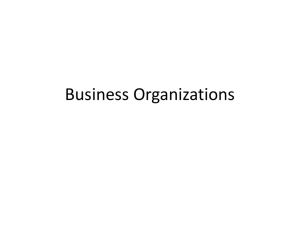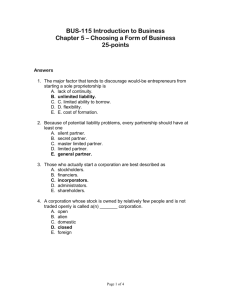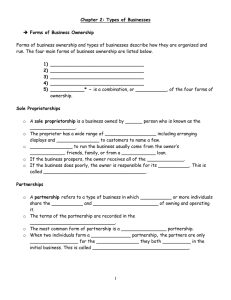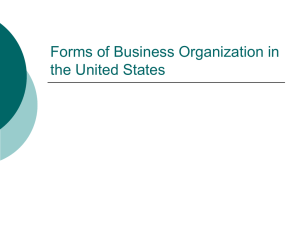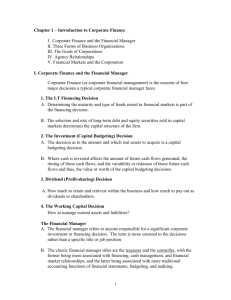Corporations
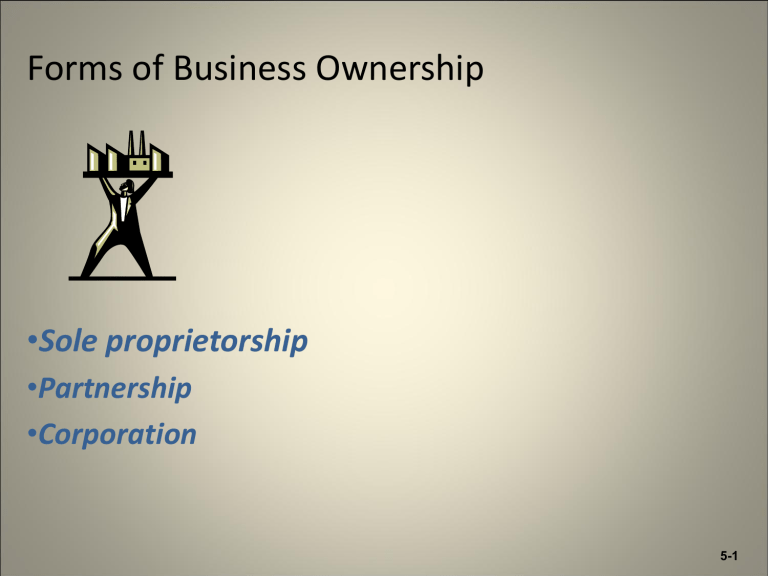
Forms of Business Ownership
• Sole proprietorship
• Partnership
• Corporation
5-1
Forms of Business Ownership
Sole Proprietorship
Businesses owned and operated by one individual; the most common form of business organization in the world
5-2
Sole Proprietorship
E.g.,
• Many restaurants
• Hair salons
• Flower shops
• Dog kennels
• Independent grocery stores
Sole Proprietorship -- Facts
• 80% of all businesses
• Men more likely than women to start own business
5-3
Forms of Business Ownership
Advantages of a Sole Proprietorship
• Ease and cost of formation
• Secrecy
• Distribution and use of profits
• Flexibility and control of the business
• Government regulation
• Taxation
5-4
Forms of Business Ownership
Disadvantages of a Sole Proprietorship
• Unlimited liability
• Limited sources of funds
• Limited skills
• Lack of continuity
• Lack of Qualified Employees
• Taxation
5-5
Forms of Business Ownership
Partnership
A form of business organization defined by the
Uniform Partnership Act as “an association of two or more persons who carry on as co-owners of a business for profit”
5-6
Forms of Business Ownership
Types of
Partnerships
• General partnership
• Limited partnership
5-7
Forms of Business Ownership
General partnership
A partnership that involves a complete sharing in both the management and the liability of the business
5-8
Forms of Business Ownership
Limited partnership
A business organization that has at least one general partner, who assumes unlimited liability, and at least one limited partner whose liability is limited to his or her investment in the business.
5-9
Partnerships Advantages & Disadvantages
Advantages
• Ease of organization
• Capital & credit
• Knowledge & skills
• Decision making
• Regulatory controls
Disadvantages
• Unlimited liability
• Business responsibility
• Life of the partnership
• Distribution of profits
• Limited sources of funds
• Taxation of partnerships
5-10
Forms of Business Ownership
Corporations
Legal entities created by the state whose assets and liabilities are separate from its owners.
5-11
Forms of Business Ownership
Corporations
Typically owned by many individuals and/or organizations who own shares of the business – stock (shareholders or stockholders)
5-12
Corporations
Stock & Dividends
Stock – shares of a corporation that may be bought or sold
Dividends – profits of a corporation that are distributed in the form of cash payments to stockholders.
5-13
Corporations
Creating a Corporation
A Corporation is created (incorporated) under the laws of the state in which it incorporates.
The individuals creating the corporation are called incorporators.
5-14
Corporations
Articles of Incorporation
Legal documents filed with basic information about the business with the appropriate state office.
5-15
Corporations
Types of Corporations
Private corporation
Public corporation
Quasi-public corporation
Non-profit corporation
5-16
Corporations
Types of Corporations
Private corporation – a corporation owned by just one or a few people who are closely involved in managing the business
5-17
Corporations
Types of Corporations
Public Corporation– a corporation whose stock anyone may buy, sell, or trade.
5-18
Corporations
Types of Corporations
Initial Public Offering (IPO) – A private corporation who wishes to go “public” to raise additional capital and expand. The IPO is selling a corporation’s stock on public markets for the first time.
5-19
Corporations
Types of Corporations
Quasi-public corporation –
Corporation owned and operated by the government (Ziraat Bank).
5-20
The Largest U.S. Corporations
Fortune’s 2007 rankings of America’s largest corporations
Rank
4
5
6
1
2
3
9
10
7
8
Company
Wal-Mart
Exxon Mobil
Chevron
General Motors
Conoco Phillips
General Electric
Ford Motor
Citigroup
Bank of America
AT&T
Revenues ($millions)
$378,799
$372,824
$210,783
$182,347
$178,558
$176,656
$172,468
$159,229
$119,190
$118,928
Corporations
Types of Corporations
Non-profit corporation – focuses on providing a service rather than earning a profit but are not owned by a government entity ( American Red Cross , Kizilay)
5-22
Corporations
• Board of directors
• Preferred stock
• Common stock
Elements of a
Corporation
5-23
Corporations
Board of Directors
Board of Directors – a group of individuals elected by the stockholders to oversee the general operation of the corporation who set the corporation’s long-range objectives.
5-24
Corporations
Stock Ownership
Preferred stock – a special type of stock whose owners, though not generally having a say in running the company, have a claim to profits before other stockholders do.
Common Stock – stock whose owners have voting rights in the corporation, yet do not receive preferential treatment regarding dividends.
5-25
Corporations
• Advantages:
– Limited liability
– Transfer of ownership
– Perpetual life
– External sources of funds
– Expansion potential
• Disadvantages:
– Double taxation
– Forming a corporation
– Disclosure of information
– Employee-owner separation
Trends in Business Ownership
• Mergers
• Acquisitions
5-27
Other Types of Business Ownership
Merger – the combination of two companies (usually corporations) to form a new company
Acquisition – the purchase of one company by another, usually by buying its stock and/or assuming its debt.
5-28
